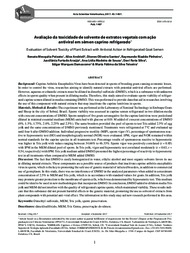Avaliação da toxicidade de solvente de extratos vegetais com ação antiviral em sêmen caprino refrigerado.
Avaliação da toxicidade de solvente de extratos vegetais com ação antiviral em sêmen caprino refrigerado.
Author(s): PEIXOTO, R. M.; ANDRIOLI, A.; SANTOS, D. O.; PINHEIRO, R. R.; ARAÚJO, J. F.; SOUSA, A. L. M. de; SILVA, D. F.; DAMASCENO, E. M.; TEIXEIRA, M. F. da S.
Summary: [Evaluation of Solvent Toxicity of Plant Extract with Antiviral Action in Refrigerated Goat Semen]. Background: Caprine Arthritis Encephalitis Virus have been detected in sperm of breeding goats causing economic losses. In order to control the virus, researches aiming to identify natural extracts with potential antiviral effects are performed. However, aqueous or ethanolic extracts must be diluted in dimethyl sulfoxide (DMSO), which is a substance with unknown effects in sperm quality when present in diluting media. Therefore, this study aimed to evaluate sperm viability of refrigerated caprine semen diluted in media containing DMSO. This was performed to provide data that aid in researches involving the use of this component with natural extracts that may inactivate the caprine lentivirus in sperm. Materials, Methods & Results: The experiment was performed at the Laboratory of Seminal Technology in Embrapa Goats and Sheep in the city of Sobral, Brazil. Sperm viability was assessed in caprine semen refrigerated in two dilution media with crescent concentrations of DMSO. Sperm samples of five goats seronegative for the caprine lentivirus were pooled and diluted in minimal essential medium (MEM) enriched with glucose at 0.01 M added of crescent concentrations of DMSO (0%, 1.5%, 1.75%, 2.0%, 2.25% and 2.5%). The same breeders provided the pool of sperm to test Tris added 2.5% of egg yolk and the same concentrations of DMSO previously mentioned. Treatments were refrigerated at 7°C and evaluated up until four h after DMSO addition. Individual progressive motility (MIP), sperm vigor (V), percentage of spermatozoa reactive to hypoosmotic test (HO) and morphologically normal (NOR) were evaluated. IPM, vigor and NOR remained within normal standards for the caprine species in all treatments test. Percentage results of spermatozoa reactive to hypoosmotic was higher in Tris yolk with values ranging between 34.66% to 46.33%. Sperm vigor was positively correlated (r = 0.85) with IPM in the MEM diluted pool of sperm. In Tris yolk, vigor and hypoosmotic test correlated moderately (r = 0.63, r = 0.54, respectively) with IPM. Tris yolk medium added DMSO presented the highest percentage of reactivity to hypoosmotic test in all treatments when compared to MEM added DMSO. Discussion: The fact that DMSO is easily homogenized in water, ethylic alcohol and most organic solvents favors its use in diluting natural extracts. These components are a possible source of products that inactivate caprine arthritis encephalitis virus in sperm, which is the key to promoting the safe use of genetic material of infected breeders, in addition to commercial use of germplasm. In this study, there was no interference of DMSO in the analyzed parameters when added in a maximum concentration of 2.5% to MEM and Tris yolk, which is in accordance with standard values for goats. In addition, Tris yolk may promote greater protection to the membrane of sperm cells, which was demonstrated by hypoosmotic test. This medium could be ideal to be used in new methodologies that incorporate DMSO. In conclusion, DMSO added to dilution media Tris yolk and MEM did not interfere with the quality of refrigerated caprine sperm, which maintained viability. These results indicate that this substance did not present harmful effects to the genetic material, promoting the use as solvent of extracts from plant compounds with potential anti-viral effect. The information in this study may aid new research performed in this area.
Publication year: 2017
Types of publication: Journal article
Unit: Embrapa Goats & Sheep
Keywords: Antimicrobial properties, Brazil, Caprine arthritis encephalit virus, Caprino, Criopreservação, Diluente, Dimetilsulfóxido, Extrato vegetal, Fitocomposto, Fitoterápico, Goats, MEM, Plant extracts, Preservação do sêmen, Semen diluents, Semen preservation, Sêmen, Tris Gema, Tris yolk, dimethyl sulfoxide
Observation
Some of Embrapa's publications are published as ePub files. To read them, use or download one of the following free software options to your computer or mobile device. Android: Google Play Books; IOS: iBooks; Windows and Linux: Calibre.
Access other publications
Access the Agricultural Research Database (BDPA) to consult Embrapa's full library collection and records.
Visit Embrapa Bookstore to purchase books and other publications sold by Embrapa.

